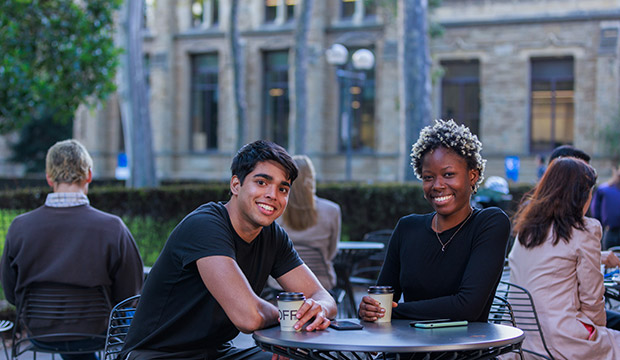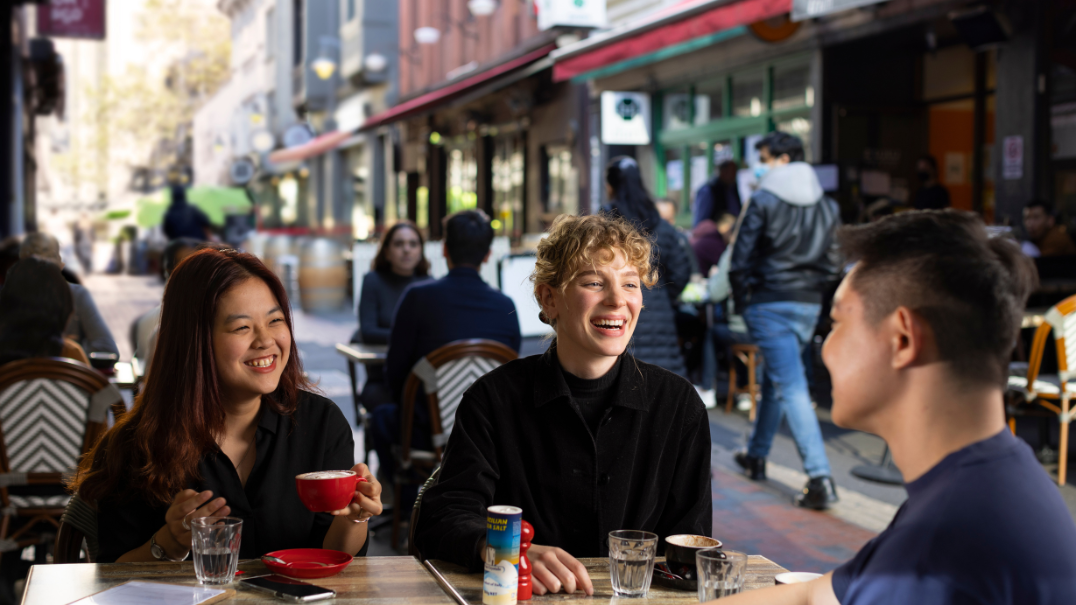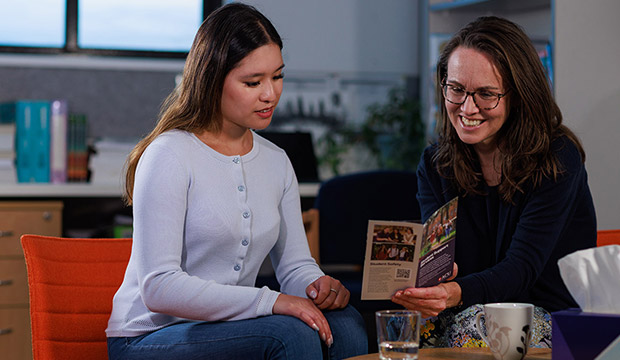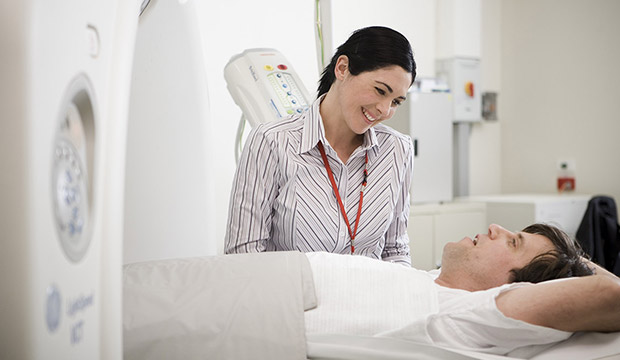When you live and study in Melbourne, you can relax knowing that you’re in one of the world’s safest cities and most liveable cities.
Although Melbourne and the state of Victoria boasts extremely low rates of crime, it’s still worthwhile to be aware of the potential risks and steps you can take to maintain your safety.
View transcript
Transcript
[On-screen text: Alexis, International student]
Alexis: When you live and study in Australia, you can relax knowing you're in one of the world's safest countries. While most of you will enjoy a smooth journey, unfortunately unwelcome situations may sometimes arise, and it's important for you to be aware of potential safety risks, including scams.
It is important to know what to look out for and to protect yourself against the most common scams. There are many ways scammers can contact you via email, calling on your phone, texting, or via messaging on social media apps.
These scams can relate to jobs and employment, visa and immigration status, accommodation and rentals, and your course fees. Visit the Study Melbourne website for more details as well as who you can speak to for more support.
Personal safety can relate to things like going out at night, theft and drinking. Some tips to keep yourself safe include avoid having your valuables on show. Don't go around with a large sums of cash and go out with a group of people. On the Victoria Police website you can find several personal safety tips and recommendations.
Your home is a place where you should feel most secure. Some easy steps to take to make you feel safe include ensuring all your doors and windows are locked, and being aware of fire safety and prevention. Your safety on the road is very important to us. Make sure you understand our road rules. If you are driving, cycling, or doing any jobs such as food delivery, Victoria generally experiences beautiful sunny summers or mild winters, perfect for experiencing the outdoors, but you must be aware of seasonal safety. Hazards such as bush fires and flooding, as well as beach, heat and sun safety are all critical to understand. If you're in an emergency, call triple zero or double one two from mobile phones if you are out of phone network range.
Your safety and wellbeing is our top priority. If you're experiencing any issues and are unsure of who to ask for, the team at the Study Melbourne Hub are here to help. You can read about health, safety, and wellbeing as an international student on the Study Melbourne website.
[End transcript]
Getting help in an emergency
If your safety is at risk or you need immediate assistance, call Triple Zero (000) and tell the operator you need the police.
You can also report non-urgent crimes or events 24/7 through the Victoria Police Assistance Line and Online Reporting service. If you’re more comfortable communicating in a language other than English, you can make a non-urgent report through an interpreter in your language by calling the Translating and Interpreting Service (TIS National) on 131 450 and asking for the Victoria Police Assistance Line.
Check out our guide to medical and emergency services to learn where to go for urgent help.
Personal safety
On the Victoria Police website, you can find several personal safety tips and recommendations. While all of these are entirely optional, they may help you feel a bit safer and more confident navigating life abroad.
For example, when it comes to preventing theft, it’s recommended to watch your valuables (e.g. your bag, wallet, jewellery or electronic devices) and keep them close to you.
In general, it’s a good idea to avoid holding cash in the open, especially large sums. If you’ve just completed a transaction or withdrawn funds from an ATM, make sure you store your money securely in your wallet before walking away.
Racism: Understanding your rights and protections
In Australia, racism is unacceptable and against the law. Support is available for anyone experiencing any kind of racism or discrimination.
If you have experienced racial abuse or feel unsafe, please contact the police at Triple Zero (000).
For non-urgent issues: Call the national Police Assistance Line on 131 444.
Ways to report racism
If you experience racism, try and get as much evidence as you can (video, screenshots, dates, witness names etc).
In Victoria you can contact The Victorian Equal Opportunity and Human Rights Commission: 1300 292 153.
You can also get help:
- on campus: get help from your education provider's support services.
- at work: contact the Fair Work Ombudsman.
- online: make a complaint to the Australian Human Rights Commission or the Office of the eSafety Commissioner.
The Victorian Community welcomes all international students, and we are so grateful that you are here bringing your ideas and culture to help make it the diverse nation that we are.
Group safety
When you’re going out in Melbourne at night, you may feel more secure by going out with a group of trusted friends. Exploring the city in larger numbers may decrease the likelihood of your safety being compromised (e.g. being harassed or attacked).
You may also want to leverage technology to stay updated on each other’s whereabouts if you do get separated. If you have an iPhone, the Find My Friends app allows you to share your location with your group and vice versa. You can also share your live location with friends using social media platforms like WhatsApp and Facebook Messenger.
SafeZone is another great platform to try. This free-to-download app hosts a Check-in and Check-in Timer feature, which enables you to share your live location with security responders. When using the timer, an alert is automatically sent on your behalf if you fail to extend or cancel it.
Walking safety
No matter where you are, staying in populated, well-lit areas - such as main streets and restaurant districts - is a great safety practice. If you can, avoid walking alone in quieter areas when it’s dark, such as public parks or low-lit laneways. This may help you feel safer and more comfortable navigating the city on your own at night.
Digital safety
As the internet continues to be an integral part of our daily lives, it pays to be on the lookout for scams. There are many ways scammers can contact you: via email, calling or texting your phone from an unknown number, or through messages on social media apps such as WeChat, Facebook and WhatsApp.
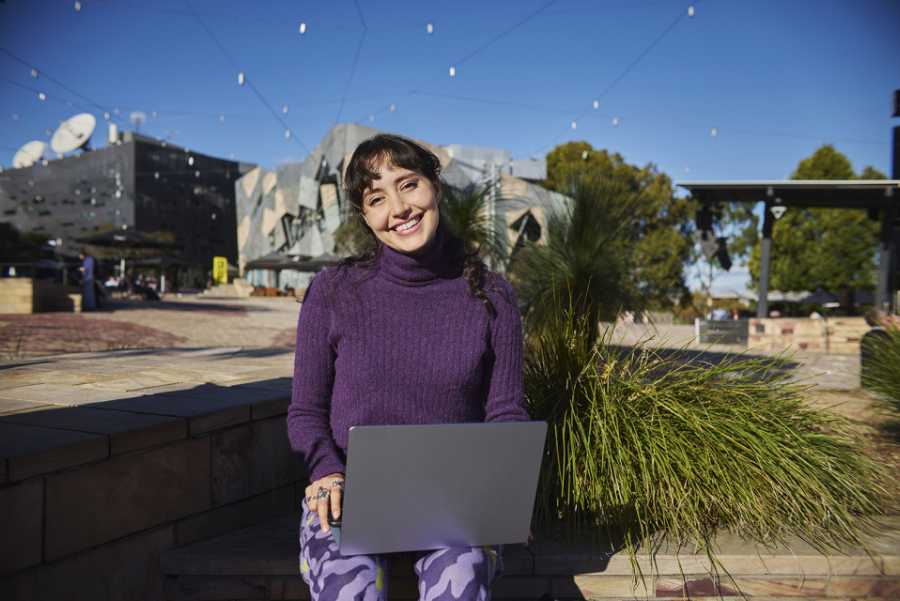
Avoid opening suspicious messages or clicking on dubious links and be wary of anyone requesting your personal information or large sums of money. In particular, international students should be aware of Chinese authority, agency, phishing, rental and tuition fee scams.
Scam targeting the Mandarin-speaking community
Victoria Police is aware of a worldwide extortion scam targeting the Mandarin-speaking community, particularly students of Chinese background.
Further information on these scams can also be located on the Victoria Police website.
If you receive suspicious communications or are concerned someone may be trying to scam you, you can report them to Scamwatch. You can also reach out to your education provider, as many offer legal services and additional advice for international students.
Read our guide to digital scams affecting international students.
Will your password pass the test of time?
A new password strength tester has been developed so that you can check your password strength and get tips on how to increase it. You can check out the secure tool on the Service Victoria app and website.
There are simple things you can do to create stronger passwords that are more difficult for cybercriminals to hack. To protect your online accounts from hackers:
- Use passphrases (four or more random words)
- Use a different password for each account
- Make your passwords harder to guess by avoiding predictable words
- Use a password manager
- Update your passwords when required
- Turn on multi-factor authentication
Victorians can also learn more about broader cybersecurity hygiene at the Vic Gov’s new Stay Safe Online website. The website covers a broad range of information on:
- Passwords
- Multi-factor authentication
- Backing up your data
- Looking out for scams
- Updating your devices
- Information leaks
Don’t wait for tomorrow. Make simple changes today.
Beach and seasonal safety
Safety in the water
Australia has some of the best beaches in the world, and the best way to enjoy them is by staying safe.
Before you dive into Victoria’s stunning beaches and waterways this summer, it’s important to keep the following safety tips in mind:
- Swim between the red and yellow flags at a patrolled beach, where lifeguards can help you. You can find patrolled beaches on the Beachsafe App.
- Always swim and visit the water with friends.
- Check and follow safety signs before you enter the water.
- Check the weather before you go to the water – conditions change quickly when the weather changes.
- Never mix alcohol and swimming.
- Learn about rip currents – the biggest danger at Victorian beaches.
To keep yourself and your friends safe, download the free Beachsafe App App and use this to check the beach danger rating and local conditions before you visit a beach.
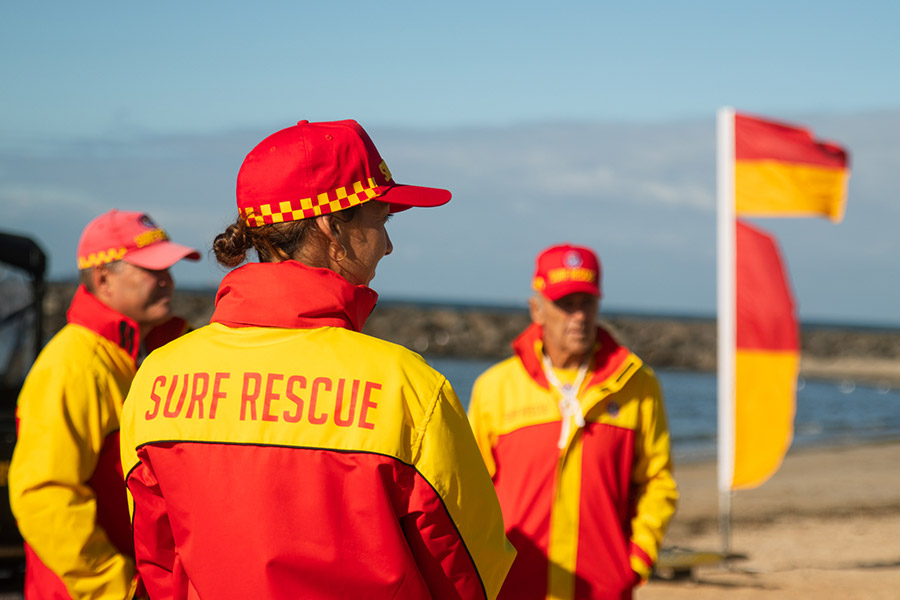
If you find yourself in trouble, the best thing to do is stay calm and hold one arm up in the air. This will signal to the lifeguards on duty that you need assistance.
Learn more about water safety via the Victorian Government. You can also find translated information on staying safe in the water.
Bushfire safety
It is very important during the fire season to stay informed.
Watch this video to understand the bush fire danger rating. During the summer make sure you check the danger rating every day for where you are or where to plan to travel.
View transcript
[Zoom in on fire danger rating sign]
[Speaker] Fire Danger Ratings tell you how dangerous a fire could be if one started.
This is important to you because the higher the rating,
the more dangerous the conditions.
The Rating should be your prompt to take action.
Fire Weather Districts
There are nine fire weather districts in Victoria and the Fire Danger Rating is forecast daily for each district, up to four days in advance.
Fire Danger Ratings start at MODERATE.
In these conditions, most fires can be controlled.
The next level is HIGH.
Fires can be dangerous in these conditions.
Be ready to act.
The safest option is to avoid bushfire risk areas.
An EXTREME rating means fires will spread quickly and be extremely dangerous.
Take action to protect your life and property.
Reconsider travel through bushfire risk areas.
A CATASTROPHIC rating means that if a fire starts and takes hold, lives are likely to be lost.
You should leave bushfire risk areas on these days.
Homes cannot withstand fires in these conditions.
Stay safe by going to a safer location early in the morning or the night before.
Know your fire weather district, if you live, work or travel through a bushfire risk area, make it a habit to check the Fire Danger Rating every day.
Leaving early, well before any fire has started is always your safest option.
Remember, monitor warnings and stay informed.
Vic Emergency is the official Victorian Government website for emergency warnings and information. This is the best and most up-to-date resource for incidents, warnings and other weather and fire-related information. You can download the VicEmergency app (AppStore and Google Play) and set your location to receive notifications and warnings.
Fire risk is most extreme if you live around or near forest or woodland. The Country Fire Authority (CFA) has a wealth of resources to help you understand your fire risk and know what to do before and during a fire. One of the best ways to start planning is to look at where you live.
Safety in the sun and heat
While you’re here, you’ll likely experience Australia’s hot summers. While summer is a great time to get out and enjoy the country, it’s important to take care in the heat as Australia experiences some of the highest levels of ultraviolet (UV) radiation in the world. UV radiation comes from the sun and is a leading cause of skin cancer.
Thankfully, it’s easy to protect yourself from the harmful effects of the sun. Anytime you are going outside - even on cool or overcast days - make sure you use sunscreen with a sun protection factor (SPF) of 50+.
It’s also a good idea to wear a hat and sunglasses and stay in shady areas as much as you can.
Overexposure to hot weather can cause cramps, dehydration, exhaustion and even heatstroke, which, in severe cases, can be deadly. On extremely hot days, drink lots of water and avoid vigorous exercise or activity, as these may cause you to overheat.
The UV Index is a handy tool you can use to protect yourself from UV radiation. It tells you the times during the day that you need to exercise the most caution in the sun by providing radiation levels. The SunSmart Global UV app works similarly, allowing you to have a convenient UV forecast on your smartphone.
Home and property safety
Your home is where you should feel most secure. There are some steps you can take to make it feel even safer.
Criminals and burglars will often target unsecured locations, so it’s always smart to ensure all your doors and windows are locked. Even if you’re in a secure building or complex, it’s best to keep your door closed and locked, especially at night.
Fire is another safety hazard in the home that can be easily avoided. Always extinguish candles and other open flames and never leave them unattended. Never use an electrical item if the cord is frayed or damaged.
In Victoria, every home must have working, compliant smoke alarms fitted. If you have concerns about the smoke alarms in your accommodation, contact your landlord or housing provider.
You may want to consider purchasing contents insurance to help with the cost of replacing your valuable items if they are damaged or stolen.
Stay battery safe
Many portable devices such as laptops, mobile phones, e-scooters and e-cigarettes contain rechargeable lithium-ion batteries.
If a Lithium-ion Battery is improperly charged, handled, stored or disposed of there is a risk of overheating, catching fire or explosion.
This also increases the risk of a house fire, garage fire or personal injury.
Stay safe by following this important advice:
- Purchase products from a reputable supplier and follow the manufacturer’s instructions.
- Only use chargers and cords that are originally supplied with that device. Using chargers with incorrect power delivery (voltage and current) can cause damage to the battery or overheating that can lead to fires.
- Only use batteries that are designed for that device.
- Avoid charging LEV batteries overnight or leaving devices unattended while charging. Once the indicator shows that a device or battery has been fully charged, disconnect it from the charger.
- Devices should always be charged on non-combustible surfaces.
- Avoid locations such as couches, beds and carpets.
- Check that chargers have the Regulatory Compliance Mark, to show that they meet the relevant Australian Standards:
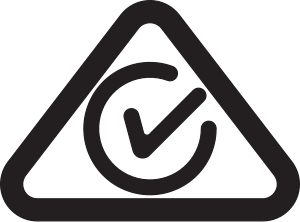
For more information, visit Fire Rescue Victoria's page.
An example of how a lithium-ion battery explosion can cause a fire.
View transcript
[Speaker, Janice, sitting in a Melbourne laneway speaking with Fire Rescue Victoria, firefighter] So today we’re going to ask a firefighter the basic three things about fire safety. Today we’re here with Jason from Fire Rescue Victoria.
[Speaker, Jason, text on screen: Jason Wagland, Fire Rescue Victoria] Hi Janice, how are you? First thing to note about lithium ion battery safety is, making sure they don’t catch fire.
[Text on screen: Tip #1, Don't overcharge the battery]
And three of the reasons are that they catch fire, is because you overcharge them, which overheats the battery.
[Text on screen: Tip #2, Charge on a hard non-flammable surface]
Make sure that you charge it on a substance like concrete or a hard surface, not in the bedroom, on carpet or anything that’s going to catch fire.
[Text on screen: Tip #3, Use the charger supplied with the device]
Also, using the wrong charger. Whatever type of charger, you got to have exactly the same one as the bike or the e-scooter.
[Speaker, Janice] What's important to know about fire safety at home?
[Speaker, Jason] In your home, the most important thing is your smoke detector. And most homes have 2 or 3 smoke detectors.
[Text on screen: Smoke detectors are essential]
[Speaker, Janice] In a situation when there's a fire, or the fire alarm goes off, what are we supposed to do?
[Text on screen: If there's a fire, call 000]
[Speaker, Jason] If there’s ever a fire in the house or apartment or anything, do not be afraid to call 000.
[Speaker, Janice] Thank you Jason, it was great having you here today.
[Speaker, Jason] No problems, Janice, I've really enjoyed it. And if you ever need the Fire Brigade, just call us on 000. We're here 24/7.
[Study Melbourne logo]
Only working smoke alarms save lives
Fires are fast. A small fire can spread to an entire room in minutes.
Without a smoke alarm a fire is more likely to damage or destroy your property. It is also more likely to cause serious injury or death. When you are asleep you lose your sense of smell. A working smoke alarm will wake you if there is smoke.
Read more on the Fire Rescue Victoria website.
View transcript
[Scenes shows bedroom with desk, lamp and chair with prices overlayed.]
Speaker: These bedroom Essentials won't save your life. But one small device could.
[Zoom out to show bed and smoke coming from across the screen. Text on screen: Smoke alarm from $20. Make a smoke alarm your next bedroom essential]
Fires that start when you're sleeping are the ones most likely to kill.
Make a smoke alarm your next bedroom essential before it's too late.
The majority of fatal house fires start in bedrooms and living areas. That is why Victorian fire services are encouraging Victorians to install smoke alarms in all bedrooms, hallways and living areas. Learn about smoke alarms and their importance.
View transcript
[Inspiring music, text on screen: Fire rescue Victoria, followed by visual of speaker talking to camera, and various illustrative animations as a graphic representation of the storyline]
Speaker 1: If a fire starts in your home, you need a working smoke alarm to give you an early warning and time to escape safely.
Did you know when you're asleep you can't smell anything? Not even the smoke from a fire in your home, but you'll definitely hear a working smoke alarm.
[Text on screen: Working smoke alarms save lives]
That's why it's so important we have working smoke alarms at home. Here's what to do to make sure they keep us safe.
[Text on screen: Where are your smoke alarms?]
First, check You have enough smoke alarms. How many do you have in your home? The law says you need at least one in each level of your home, but the more the better. To be the safest we can, there should be a smoke alarm in all bedrooms, living rooms, and hallways.
[Text on screen: Test your smoke alarms every month]
And did you know you should test them every single month? Press the test button on the smoke alarm for two or three seconds to check if it's working.
[Text on screen: If the smoke alarm is not working, you may need to change the battery or the whole alarm]
If the smoke alarm is not working, you may need to change the battery or the whole alarm.
[Text on screen: Renters should test their smoke alarms every month and tell their rental provider if they're not working]
Renters should test their smoke alarms every month and tell their rental provider if they're not working.
[Text on screen: Change the battery every year]
If you have a smoke alarm with a nine volt battery, the battery needs to be changed every year. If it makes a single beeping sound, that means it needs a new battery.
[Text on screen: Change your smoke alarms every 10 years]
And no matter what kind of smoke alarm it is, you need to replace the whole unit every 10 years.
[Text on screen: Install smoke alarms with long life batteries]
When it is time to get a new smoke alarm, the best option is a 10-year lithium battery smoke alarm. A 10-year lithium battery smoke alarm is best. They last the whole 10 years. You never need to change the battery. But remember, only an electrician can change a smoke alarm if it's connected to electricity.
[Text on screen: Install interconnected smoke alarms]
For the best protection, all smoke alarms should be interconnected so that when any alarm sounds, they will all sound.
[Visual of firefighter talking to camera]
[Text on screen: Smoke alarms save lives]
Make sure you test your smoke alarms regularly. Only working smoke alarms save lives.
[On-screen logo]
Fire Rescue Victoria
[End transcript]
Drink safety
When possible, we recommend keeping an eye on your beverages - alcoholic or otherwise. Although it’s rare, drink spiking can happen so you may want to take steps to protect yourself against this risk. If you do need to leave your drink for whatever reason, you may want to consider leaving it with a trusted friend.
According to Victoria Police, you can become more vulnerable to violence and accidents when you drink in excess. You can learn more about staying within your limits and other personal safety tips via the Victoria Police website.
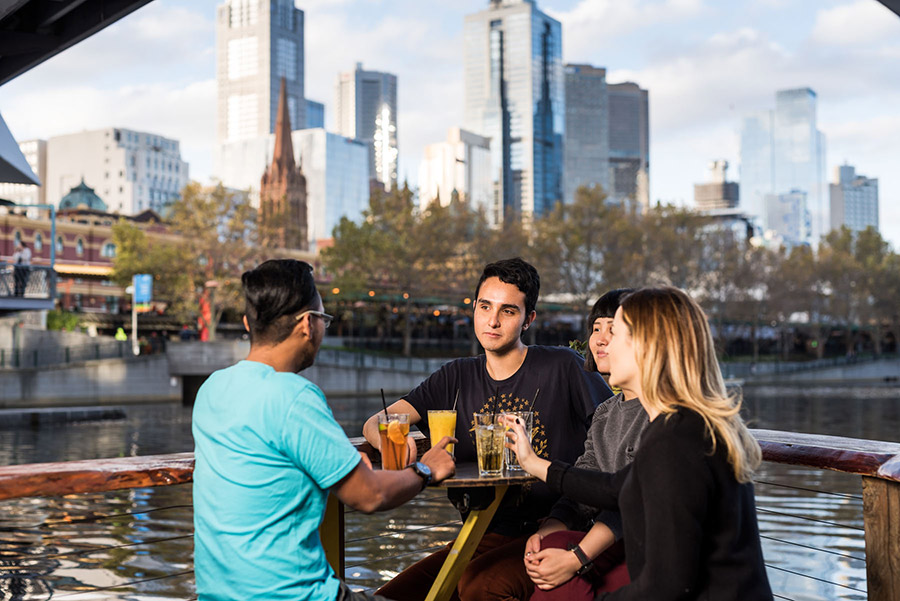
Travel safety
The Department of Infrastructure and Regional Development has some tips for how to make the most out of holidays in Australia. Visit the Travel Safely in Australia page on the Department of Infrastructure and Regional Development website.
Safety on the road
Your safety on the road is very important. Make sure you understand our road rules if you are driving, cycling, or working in jobs such as food delivery.
Safety Messages for drivers and cyclists are available in 9 different languages on the VicRoads website. These pages provide road rule reminders and advice on the following topics:
- Giving way when turning right and to pedestrians
- Looking out for cyclists when opening your car door
- Stopping at tram stops
- Hook turns
- Spaces for riding bikes
- Riding a bike at night
- Who can cycle on a footpath
- Sharing the road with trucks
Road and bicycle safety messages are available in nine different languages on the Vic Roads website.
- Arabic - العربية : VicRoads
- Chinese simplified - 简体中文 : VicRoads
- Hindi - हिंदी : VicRoads
- Malay - Bahasa Melayu : VicRoads
- Nepali नेपाली : VicRoads
- Sinhalese සිංහල : VicRoads
- Spanish Español : VicRoads
- Tamil தமிழ் : VicRoads
- Vietnamese - Tiếng Việt : VicRoads
To learn more about our road rules, we encourage you to read the A-Z of Road Rules.
For more information about sharing the road please refer to the following pages:
- Drivers and sharing the road : VicRoads
- Bike riders and sharing the road : VicRoads
- Pedestrians and sharing the road : VicRoads
For further information please email RoadSafetyVictoria@roads.vic.gov.au
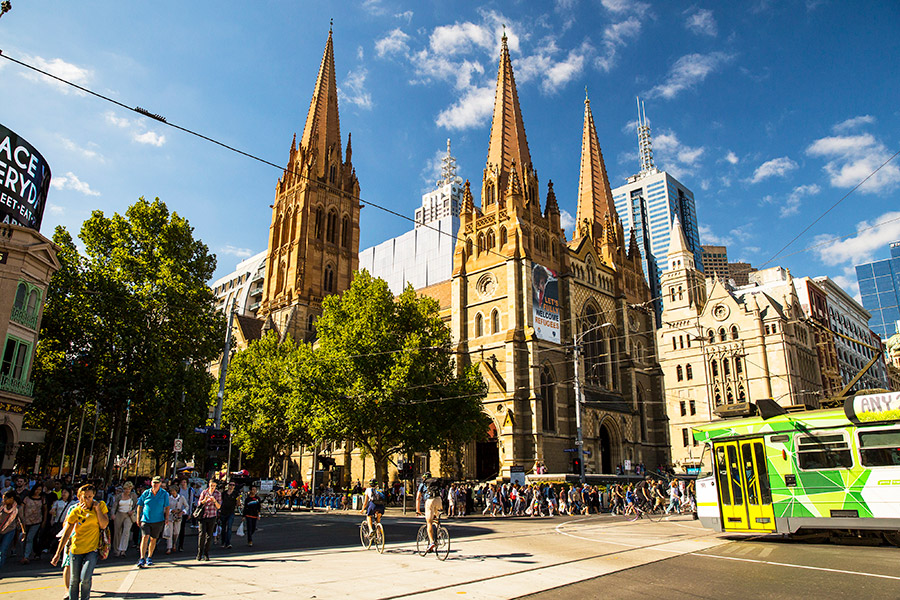
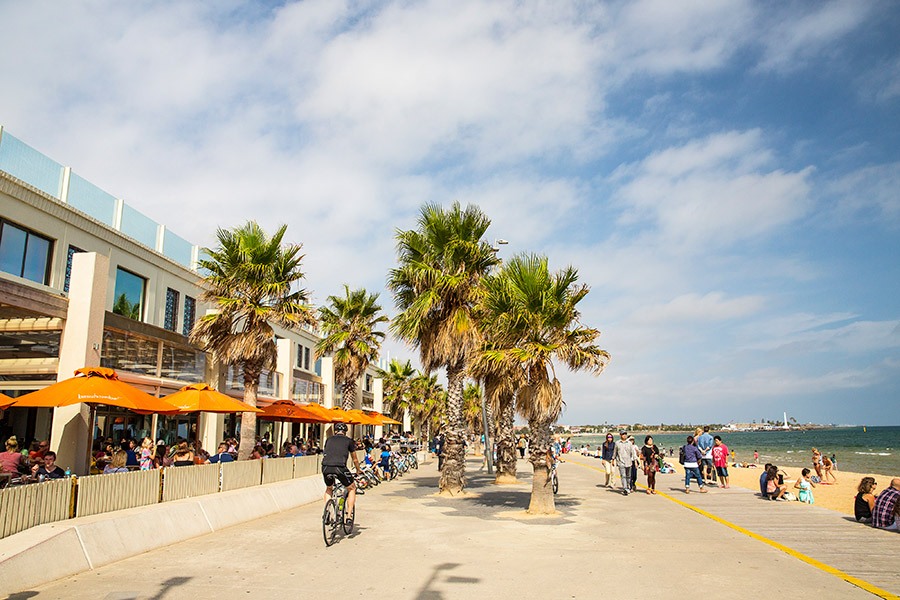
Page last updated:

